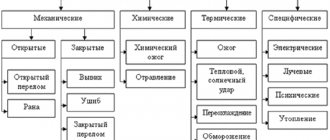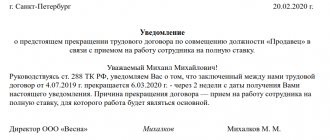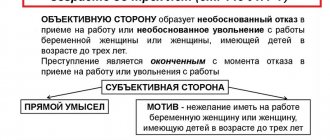The employer has the right to: conclude, amend and terminate employment contracts with employees in the manner and on the terms established by this Code and other federal laws; conduct collective negotiations and conclude collective agreements; encourage employees for conscientious, effective work; require employees to perform their job duties and take care of the employer’s property (including the property of third parties owned by the employer, if the employer is responsible for the safety of this property) and other employees, and to comply with internal labor regulations; bring employees to disciplinary and financial liability in the manner established by this Code and other federal laws; adopt local regulations (with the exception of employers - individuals who are not individual entrepreneurs); create associations of employers for the purpose of representing and protecting their interests and join them; create a production council (with the exception of employers - individuals who are not individual entrepreneurs) - an advisory body formed on a voluntary basis from among the employees of a given employer, who, as a rule, have achievements in work, to prepare proposals for improving production activities and individual production processes , introduction of new equipment and new technologies, increasing labor productivity and qualifications of workers. The powers, composition, and procedure for the activities of the works council and its interaction with the employer are established by local regulations. The powers of the works council cannot include issues the resolution of which, in accordance with federal laws, falls within the exclusive competence of the organization’s management bodies, as well as issues of representation and protection of social and labor rights and interests of workers, the resolution of which, in accordance with this Code and other federal laws, is assigned within the competence of trade unions, relevant primary trade union organizations, and other representatives of workers. The employer is obliged to inform the works council about the results of consideration of proposals received from the works council and about their implementation; exercise the rights granted to him by legislation on special assessment of working conditions.
The employer is obliged to: comply with labor legislation and other regulatory legal acts containing labor law norms, local regulations, terms of the collective agreement, agreements and employment contracts; provide employees with work stipulated by the employment contract; ensure safety and working conditions that comply with state regulatory requirements for labor protection; provide employees with equipment, tools, technical documentation and other means necessary to perform their job duties; provide workers with equal pay for work of equal value; pay the full amount of wages due to employees within the time limits established in accordance with this Code, collective agreement, internal labor regulations, and employment contracts; conduct collective negotiations, as well as conclude a collective agreement in the manner established by this Code; provide employee representatives with complete and reliable information necessary for concluding a collective agreement, agreement and monitoring their implementation; familiarize employees, against signature, with the adopted local regulations directly related to their work activities; timely comply with the instructions of the federal executive body authorized to exercise federal state supervision over compliance with labor legislation and other regulatory legal acts containing labor law norms, other federal executive bodies exercising state control (supervision) in the established field of activity, pay fines imposed for violations of labor legislation and other regulatory legal acts containing labor law standards; consider submissions from the relevant trade union bodies and other representatives elected by employees about identified violations of labor legislation and other acts containing labor law norms, take measures to eliminate the identified violations and report the measures taken to the specified bodies and representatives; create conditions that ensure the participation of employees in the management of the organization in the forms provided for by this Code, other federal laws and the collective agreement; provide for the everyday needs of employees related to the performance of their job duties; carry out compulsory social insurance of employees in the manner established by federal laws; compensate for harm caused to employees in connection with the performance of their labor duties, as well as compensate for moral damage in the manner and on the terms established by this Code, other federal laws and other regulatory legal acts of the Russian Federation; perform other duties provided for by labor legislation, including legislation on special assessment of working conditions, and other regulatory legal acts containing labor law norms, collective agreements, agreements, local regulations and employment contracts.
What is the significance of Article 22 of the Labor Code of the Russian Federation?
Art. 22 is included in the first section of the Labor Code of the Russian Federation, which provides a basic idea of the concepts with which this code operates. The purpose of creating the Labor Code of the Russian Federation was to regulate the relationship between the two parties to labor relations: the employee and the employer (Articles 1, 15, 20 of the Labor Code of the Russian Federation). These relationships are of a contractual nature (Article 16 of the Labor Code of the Russian Federation) and, accordingly, imply the existence of mutual obligations of the parties.
That's why Art. 22 of the Labor Code of the Russian Federation, which establishes the rights and obligations of the employer, largely echoes the content of Art. 21 of the Labor Code of the Russian Federation, which defines the rights and obligations of the employee. What the employee has the right to, the employer is obliged to provide (provide) to him, and vice versa. For example:
- the employee has the obligation to perform the functions assigned to him, and the employer has the right to demand this;
- the employee has the right to compensation for harm caused to him in connection with his work (including moral), and the employer has an obligation to provide such compensation.
At the same time, the lists of the rights of both the employee and the employer, as well as the employee’s responsibilities, are exhaustive, while the list of the employer’s responsibilities is open. This is due to the fact that, by defining the basic principles on which labor relations should be built, the Labor Code of the Russian Federation allows for their individualization (expansion and addition) for each specific employer.
This is done by developing internal regulations. However, Art. 8 of the Labor Code of the Russian Federation clearly prohibits the inclusion of norms that worsen the position of the employee in comparison with labor legislation. So, in accordance with internal regulations, the employer may have additional responsibilities, but the employee does not.
During probationary period
Article 70 of the Labor Code of the Russian Federation (Part 3) states that an employee undergoing a probationary period at an enterprise has the same rights and job responsibilities as persons working there on a permanent basis. However, you need to know the following nuances.
Wage
The management of many organizations, when hiring a new employee on a probationary period, sets his salary, the amount of which is less than what is due for this position in accordance with the staffing table. This means a violation of the employee's rights.
Voluntary health insurance
An enterprise’s collective agreement may provide for benefits and other advantages for employees, including voluntary health insurance. If the probationary period coincides with the specified period, it means that the employee cannot yet count on them.
The probationary employee can count on these same guarantees from the first days of his employment, unless the internal regulations of the enterprise imply a certain duration of work in the organization before all these benefits become available.
Simplified and accelerated termination of an employment contract
If an employee expresses a desire to leave the enterprise without waiting for the completion of the test, he is not required to work for two weeks from the date of submitting the appropriate application, but can leave on the day it is transferred to management.
On the other hand, if the employer has already become aware of the inability of his new employee to perform duties properly, he has the right to early terminate the employment contract before the completion of the test, giving three days' notice.
What is the list of rights included in Art. 22 of the Labor Code?
In Art. 22 of the Labor Code of the Russian Federation states that the employer has the right:
- to conclude, amend and terminate employment agreements;
- requirement for the performance of specified labor functions, responsible attitude towards property, compliance with labor regulations;
- conducting negotiations with employees and concluding collective agreements;
- adoption of internal regulations (except for individual employers);
- rewarding the employee for a responsible attitude to work and punishment for violations of discipline and causing damage;
- creation of employers' associations;
- formation of works councils (except for individual employers);
- implementation of rights granted by law regarding special assessment of working conditions.
For information on where an employee can check whether his employment contract complies with the requirements of current legislation, read the article “A service for checking employment contracts has been launched.”
Grounds for the emergence of labor relations
Such relations are based solely on their legal formalization.
The age at which it is possible to officially register for employment with all legal consequences arising is 16 years.
- A contract or employment agreement is concluded between the employer and the employee.
- for elective positions the basis is the fact of collegial election.
- there is a competitive election to a position with the subsequent conclusion of a contract;
- in practice, it is possible to actually be allowed to perform duties without prior official registration.
From a legal point of view, the employment relationship has already come into force when the subordinate begins work. To avoid controversial situations, it is recommended to register the employee properly.
Any changes are made by agreement of both parties.
The employment relationship is terminated by termination of the contract in accordance with the Labor Code.
Work under civil contracts and the performance by an individual of one-time professional duties on behalf of a private person are not recognized as labor relations. They are regulated by civil law and belong to the category of civil law relations.
What is the main right of the employer as a party to the employment agreement based on?
The main thing for the employer is always the right, based on the opportunity to attract the employee to work in his own interests and to ask him for fulfilling the agreed requirements. Both of these issues are considered in the Labor Code of the Russian Federation in great detail and are separated into separate sections of the code.
The text of each section contains instructions that the procedures for formalizing (changing) labor relations and punishing employees must strictly comply with the rules established by the Labor Code of the Russian Federation and other laws at the federal level. Despite the presence of such an indication, attention to this issue is additionally drawn to Article 22 of the Labor Code of the Russian Federation.
The most important component of the legal basis for the relationship between employee and employer are internal regulations, which can be both industry-specific and individual for each specific employer. It is acceptable for them to take the following forms:
- collective agreement;
- local regulatory act (regulations, order);
- additional conditions included in the employment agreement with a certain employee.
The Labor Code of the Russian Federation gives the employer the right to participate in the development, adoption and amendment of such documents, regardless of their nature. Accordingly, the right to negotiate with the collective of workers (or representatives of the collective) is also provided.
Read about the preparation of one of the mandatory local regulations in the material “Internal Labor Regulations - Sample 2015”.
Peculiarities
- They are characterized by a length of time. The relationship between the parties is regulated by contracts, agreements, and contractual obligations.
- They are of a remunerative nature, i.e., for the performance of assigned professional duties, the employee receives a monetary reward.
- The employee is part of the work collective, which is absent in related relations.
- Unlike civil legal relations, where everything is aimed at obtaining a result, in labor law the process itself is evaluated.
- The employee, in addition to performing assigned professional functions, is obliged to follow the daily routine at the enterprise. In civil legal relations, the specialist independently determines his schedule.
- In the field of labor relations, the employer is fully responsible for organizing the process, and in civil law, everyone is their own boss.
- The volitional nature of the legal relations under consideration is expressed in giving the manager the right to bring the violating employee to disciplinary liability.
Relations between organizations and employees in the Russian Federation are regulated by the Constitution of the Russian Federation, the Labor Code, labor agreements, contracts and local regulatory and legal acts of enterprises.
How can an employer influence employee behavior?
By requiring an employee to fulfill all the rules established specifically for him (job functions) and for the entire team (internal labor regulations, labor protection requirements), the employer has the right to:
- encourage him for a responsible attitude towards his duties or for some special achievements in work;
- punish for violations.
Encouragement can be expressed in different forms (Article 191 of the Labor Code of the Russian Federation). For example, in the form:
- gratitude;
- diplomas;
- awards;
- gift;
- incentive payments.
The use of incentives can have either a systematic form, based on an internal regulatory act, or a one-time form, determined by individual orders of the manager.
Punishments are a consequence of violations:
- disciplinary nature, in which disciplinary liability occurs (Article 192 of the Labor Code of the Russian Federation);
- associated with causing damage to the employer and entailing financial liability (Chapter 39 of the Labor Code of the Russian Federation).
The possibility of applying punishments is regulated quite strictly by law, requires compliance with certain rules when issuing them and is limited by a time frame.
Read about what disciplinary liability may be in the article “Disciplinary liability of an employee and its types.”
List of documents for registration for work according to the Labor Code of the Russian Federation
This issue is regulated by Art. 65 Labor Code of the Russian Federation. The list contains the following documents that are needed for official registration:
- Passport (other identification document is possible).
- Employment history.
- A document confirming registration in the individual (personalized) accounting system can be provided electronically.
- For those liable for military service and citizens subject to conscription - a military registration document (military ID or certificate of a citizen subject to conscription).
- Document on education, qualifications or special skills - if necessary.
- When applying for a job, some organizations may require a certificate of the presence (absence) of a criminal record and a certificate indicating whether the person is or is not subject to administrative punishment for the use of narcotic drugs or psychotropic substances without a doctor’s prescription.
- It is also possible to provide a medical certificate or sanitary record when hiring for certain types of work or positions and is mandatory when hiring minors under the age of 18.
- In some cases, depending on the specifics of the work, the employer may require additional documents.
Documents not provided for by the Labor Code are prohibited from being required from an employee.
In 2021, the rules for maintaining work records have undergone dramatic changes.
Citizens who had work books before December 31, 2020 could submit an application at their place of work to maintain an “electronic work book” in 2020, and at the same time receive their paper work book with full responsibility for it in the future.
Employees who have not submitted an application will continue to keep a regular paper work book, but they can submit an application to switch to an electronic one at any time, and they will retain this right when moving to another employer. Citizens who did not have a work book as of December 31, 2020 and began their working activities after this date will only have electronic work books.
Why are employers' associations needed?
The right of employers to form associations serves the following purposes:
- their representation in any bodies;
- development of unified approaches and documents;
- conducting collective bargaining;
- exchange of information;
- preparing proposals for implementation at the legislative level;
- protection of common interests.
Depending on the scale of these goals, unification can occur at a variety of levels - from territorial to all-Russian. It is also possible to form industry and inter-industry associations.
The process of creating and functioning of associations is based on the rules set out in the Federal Law:
- “On employers' associations” dated November 27, 2002 No. 156-FZ;
- “On the Russian Tripartite Commission for the Regulation of Social and Labor Relations” dated 01.05.1999 No. 92-FZ.
Concept and types of subjects of labor law
The labor legal relationship, like any legal relationship, includes three elements: subjects, objects and content. The subjects of a legal relationship are its participants who must have legal personality (be subjects of law). The objects of the legal relationship are those benefits for the sake of which the subjects enter into a legal relationship, for example, the object of the labor legal relationship is the paid labor process: the employer is interested in the work of the employee who creates new value, and the employee is interested in remuneration for his labor.
The content of the legal relationship is the subjective rights and legal obligations of the participants in the legal relationship, enshrined in labor legislation.
Subjects of labor law are persons potentially capable of being participants in labor relations and relations directly related to them. There are several classifications of subjects of labor law.
Classification of subjects by degree of importance:
- main subjects (they are the employee and the employer - the only possible participants in labor relations);
- additional subjects (all other subjects are participants in relations directly related to labor, but not labor relations themselves).
Classification of subjects by number (by degree of organization):
- individual (individuals);
- collective (legal entities and other entities).
Individual subjects include:
- workers;
- persons recognized as unemployed;
- employers are individuals;
- mediators in resolving collective labor disputes, etc.
As we see, individuals can act in labor and closely related relations, having different legal status.
Collective subjects of labor law are:
- employers are legal entities;
- labor collectives;
- trade unions;
- employers' associations;
- employment service authorities;
- commissions for regulating social and labor relations (social partnership bodies);
- labor dispute commissions;
- conciliation commissions;
- labor arbitrations;
- Federal Labor Inspectorate;
- government supervision, etc.
Each of the subjects of labor law has its own labor legal status.
The legal status of the subject of labor law consists of such elements as:
- labor legal personality, including legal, legal and delictual capacity;
- subjective rights and legal obligations;
- legal guarantees for the implementation of rights and obligations (general and special);
- legal liability for violation of labor legislation, employment contracts, acts of social partnership.
The concept of “legal personality” has been developed in detail in civil science, and embodied in civil legislation. It is civil scholars who conduct the main debates about the content of legal personality. V.S. He gives a classic definition of the term: “Legal personality is the socio-legal ability of a subject to be a participant in civil legal relations.”
In labor law, the concept of legal personality is less developed, like many other concepts introduced from related industries. Labor legal personality is understood as the ability, recognized by labor legislation, to be the subject of labor and closely related relations, to have labor rights and obligations, to implement them through one’s actions, and to be responsible for labor violations.
Features of the elements of the legal status of individual subjects of labor law will be discussed in the following sections of this chapter and in other chapters of the textbook.
What are works councils according to Art. 22 Labor Code of the Russian Federation?
Since May 2013, after the Federal Law “On Amendments to Article 22 of the Labor Code of the Russian Federation” dated May 7, 2013 No. 95-FZ, additions to the text of the article, another right of the employer appeared - to form production councils. This body, which can be created by any employer except an individual employer, is advisory (consultative), formed on a voluntary basis from representatives of the most qualified and active workers.
The goals of its creation are to develop proposals on the following issues:
- optimization of processes of the employer's core activities;
- introduction of new technologies and equipment;
- increasing the level of qualifications of personnel and their productivity.
All necessary aspects related to the formation and process of work of this body are established by the employer by its internal regulations. It should include the following provisions:
- about the powers of the council and the range of tasks it solves;
- the procedure for convening and possible current operating procedures;
- the number of council members and the composition of employee representatives in it.
The right to create a works council, established by Art. 22 of the Labor Code of the Russian Federation , is applied with comments regarding its competence: it includes exclusively issues of improving production activities, but not functions related to the process of managing the activities of the employer or representing the interests of employees. The employer is obliged to communicate the result of consideration and implementation of proposals developed by the council to its participants.
Regulation of labor of minors
Works where the use of minors is prohibited (Article 265 of the Labor Code of the Russian Federation):
- Work with harmful or dangerous working conditions;
- Underground works;
- Work, the performance of which may harm their health and moral development (gambling business, work in night cabarets and clubs, production, transportation and trade in alcoholic beverages, tobacco products, narcotic and other toxic drugs, materials of erotic content);
- Carrying and movement of heavy objects by workers under the age of eighteen;
- Send on business trips;
- Involvement in overtime work;
- Night work;
- Work on weekends and non-working holidays;
- Termination of an employment contract at the initiative of the employer.
What are the rights of an employer in the field of special assessment of working conditions?
The rights of the employer in the field of special assessment of working conditions are established by Art. 4 Federal Law “On special assessment of working conditions” dated December 28, 2013 No. 426-FZ and include the possibility of:
- requirements to substantiate the results of the special assessment;
- carrying out an unscheduled procedure for assessing working conditions;
- requirements from the organization carrying out the special assessment for documents confirming its competence to conduct such an assessment;
- appealing the results of a special assessment if you disagree with them.
For information on how a special assessment is carried out, read the material “Procedure for assessing working conditions in the workplace (nuances).”
What's in Art. 22 of the Labor Code of the Russian Federation is defined as the obligations of the employer?
Among the responsibilities of the employer in Art. 22 of the Labor Code of the Russian Federation indicates the need:
- compliance with all labor legislation standards established by the Labor Code of the Russian Federation, other laws, internal regulations and labor agreements;
- providing the employee with exactly the work that was agreed upon with him during his employment;
- ensuring the safest possible working conditions and their compliance with state standards regarding labor protection;
- providing the employee with the technical means necessary to perform his job functions;
- eliminating discrimination when paying for work of equal value;
- timely and full payment of wages within the deadlines established by the employer in accordance with the requirements contained in the Labor Code of the Russian Federation;
- compliance with the procedure for representation during collective negotiations with employees, including the conclusion of a collective agreement;
- complete and timely provision of information to employees that they must have when developing a collective agreement;
- familiarizing employees with all internal regulations relevant to their job responsibilities;
- timely compliance with all instructions of supervisory authorities authorized to conduct inspections of compliance with labor legislation;
- adequate response to information from bodies representing the interests of workers regarding violations of labor rights;
- creating conditions for the participation of employees in the management of a legal entity in the forms specified by law;
- providing for the everyday needs of employees arising during the performance of their labor functions;
- performing procedures related to compulsory social insurance;
- compensation for damage (including moral) received by the employee in connection with his work duties;
- performance of duties related to special assessment of working conditions;
- fulfilling other duties provided for by the Labor Code of the Russian Federation and internal regulations.
What is a fixed-term employment contract?
A fixed-term employment contract (Article 59 of the Labor Code of the Russian Federation) is concluded for a certain period with a precise indication of its validity period. The maximum period of its validity according to labor legislation is 5 years. No more.
STD can be concluded with the following categories of workers:
- Citizens undergoing internship.
- Full-time students.
- Persons sent by employment centers to temporary and public work.
- Workers of culture, art, cinematography (actors, directors, screenwriters and others).
- Citizens performing alternative civil service.
- The employee is hired to perform certain work or sent to temporarily created companies.
- The employee is hired during the absence of the main employee (for example, during maternity leave).
- Managers, deputies, chief accountants.
- Employees sent to work abroad.
- When filling an elective position.
It is impossible to draw up a fixed-term employment contract at the request of the employer, even with the consent of the employee, if this case is not provided for by the Labor Code.
In some situations, after the expiration of the employment contract, if the employee continues to work in his position, this contract will be considered indefinite (Article 58 of the Labor Code of the Russian Federation).
What are the responsibilities of the employer in terms of organizing the labor process?
The employer must provide each hired employee with the opportunity to perform exactly those functions that are specified in the employment agreement and job description. The requirement to perform other work is prohibited by law (Article 60 of the Labor Code of the Russian Federation) and becomes possible only as a temporary measure (Article 72.2 of the Labor Code of the Russian Federation) either with the consent of the employee or without it (in emergency situations).
The ability to perform the work must be technically ensured by the employer (by providing the necessary tools, equipment and other means), if this follows from the essence of the assigned work. If it is impossible to carry out a labor function due to the lack of necessary technical means, the blame for the employee’s downtime lies with the employer, who is obliged to pay for the time of such downtime (Article 157 of the Labor Code of the Russian Federation).
Conditions for performing work functions must be as safe as possible for the employee. In this regard, the employer has responsibilities (Article 212 of the Labor Code of the Russian Federation):
- to identify harmful and dangerous factors in the workplace;
- informing the employee about these factors and safety measures;
- provision of special protective equipment and training in their use;
- demonstration of safe operation techniques using the provided technical equipment;
- training in emergency behavior and first aid techniques.
To find out whether the cost of workwear issued to an employee should be subject to personal income tax, read the article “When is workwear subject to personal income tax and when not?”
The employer must take care of ensuring the work and rest schedule, as well as the sanitary and domestic needs of people. In particular, it is important to comply with:
- the required length of rest periods (Articles 108–111 of the Labor Code of the Russian Federation);
- duration and frequency of regular vacations (Articles 115, 124 of the Labor Code of the Russian Federation);
- cleanliness in work areas and regularity of their cleaning (Article 209 of the Labor Code of the Russian Federation);
- measures of protection from cold and excessively high temperatures (Article 212 of the Labor Code of the Russian Federation);
- conditions for regular comfortable eating and sanitary and hygienic procedures (Article 223 of the Labor Code of the Russian Federation).
Another obligation of the employer related to the organization of labor is the need for compulsory social insurance of employees and the payment of related payments aimed at:
- for the formation of a future pension;
- provision of a minimum amount of free medical services;
- payment of sick leave and benefits related to maternity;
- prevention of accidents at work.
Read more about the possibilities of social insurance provided by the Social Insurance Fund in the material “Compulsory social insurance in the Russian Federation - types and contributions.”
Rights and obligations of the employee and employer under the Labor Code of the Russian Federation
Since the employer and employee are integral subjects of a single labor process, the rights of one party reflect the responsibilities of the other party.
The table below briefly demonstrates this relationship between the responsibilities of an employee and the rights of his employer:
| Scope of application | Responsibilities of the employee | Employer's rights |
| Labor contract | Carefully perform the functions described in this document | Expectation of full implementation of all points of this document |
| Workflow organization | Strict compliance with the internal regulations of the enterprise | Requirement to adhere to the established work schedule |
| Careful observance of labor discipline | Communication of all rules of behavior and work and expectation of their strict implementation | |
| Compliance with established standards in full | Setting standards in the form of a job description. Making oral and written comments in case of improper performance of duties | |
| Ensuring your work safety | Indication of the need to comply with labor safety regulations | |
| Careful attitude towards the employer's property, which he uses during work | When transferring equipment and equipment to an employee, receiving them after his dismissal in the same condition in which it was transferred at the time of his employment | |
| Immediately informing management about the occurrence of situations that may pose a threat to the life and health of persons at work, as well as to property | Obtaining information about possible problems and threats and responding to them in a timely manner |
An employee's rights are a consequence of his employer's responsibilities. This relationship is presented in the table below:
| Scope of application | Employee right | Employer's obligation |
| Employment contract | Conclude this document upon employment, keep one copy with the signature of the management and the seal of the enterprise | Draw it up in the first days of the new employee’s work, sign both copies properly, keep one of them in the personal file in the HR department, and the other hand it over to the employee |
| Employment history | Receive a proper employment certificate, executed in accordance with all the rules, five days from the date of signing the employment contract | If this is the employee’s first experience in employment, draw up a work book from scratch, and if it exists, put a mark on employment, confirming it with a signature and seal |
| Wage | Receive wages twice a month (in the form of an advance and the main part) strictly on the agreed days, without delays, in full in accordance with the salary | Organize payments in a timely, formal manner, including appropriate taxes. |
| Workplace | During the working day, be in a comfortable space equipped with everything you need | Maintain all equipment at the proper level and replenish supplies as necessary |
| Work and rest schedule | Do not work on weekends and holidays, and if necessary, attend the workplace during this period, receiving monetary compensation | Try to avoid attracting employees on weekends and holidays and only if there is an urgent need to call them to work with an official order with mandatory subsequent payment for their departure |
| Annual leave | Take annual paid leave either in whole or in parts. If you do not want to rest, receive monetary compensation for “non-vacation” days upon dismissal | Provide this opportunity without interfering, even if a very valuable employee is going on vacation |
| Paid sick leave | To be released from work if one or a close relative is ill and needs constant care | Pay for forced days of absence, do not refuse them |
| Smoking at work | The opportunity to indulge in this bad habit in specially designated places | Provide employees with special places, equip them with the necessary elements and signage |
| Dismissal | Leave the company on any day of your own free will, notifying management in writing 2 weeks before the planned date | Do not interfere with the departure, give the resigning employee his work book with the necessary entry and all cash payments covering earnings and compensation for vacation, if it was not used |
What must an employer observe when paying for work?
The employer's responsibilities for remuneration are in fact much broader than those specified in Art. 22 of the Labor Code of the Russian Federation (non-discrimination in payment for work of equal value, meeting deadlines, complete payment of wages), and require compliance (Articles 135, 136 of the Labor Code of the Russian Federation):
- a remuneration system developed and approved by the employer;
- the procedure for notifying the employee about the formation of the total monthly payment amount;
- forms of issuing money convenient for the employee (cash at the place of work or by bank transfer to the bank specified by the employee);
- frequency of payments at least 2 times a month with an interval of 2 weeks between them;
- dates established for the payment of wages by internal regulations.
Regarding payment terms, the following options are possible:
- wages are paid in advance (on the previous working day), the deadline for which, established by internal regulations, falls on a day off (Article 136 of the Labor Code of the Russian Federation);
- vacation pay is paid in advance (at least 3 calendar days before the start of the vacation) (Article 136 of the Labor Code of the Russian Federation, letter of the Federal Service for Labor and Employment dated December 21, 2011 No. 3707-6-1);
- Sick leave is paid on the salary payment date closest to the calculation made (10 calendar days are allotted for it) (clause 1 of Article 15 of the Federal Law “On compulsory social insurance in case of temporary disability and in connection with maternity” dated December 29, 2006 No. 255-FZ) ;
- directly on the day of dismissal, all amounts not received by the employee before that day are paid (Article 140 of the Labor Code of the Russian Federation).
Failure to comply with the 2-week interval and established deadlines may result in the following for the employer:
- administrative fine for failure to comply with the requirements of labor legislation (Article 5.27 of the Code of Administrative Offenses of the Russian Federation);
- payment to the employee of monetary compensation for the delay (Article 236 of the Labor Code of the Russian Federation);
- transfer of vacation at the request of an employee who did not receive vacation pay on time (Article 124 of the Labor Code of the Russian Federation);
- the need to pay the employee for the time of suspension of work resulting from a delay in payment of wages (Article 142 of the Labor Code of the Russian Federation);
- criminal liability for a manager who caused a delay due to personal interest (Article 145.1 of the Criminal Code of the Russian Federation).
Pros and cons of official employment
By this term we will understand registration under an employment contract. There is a second option - signing a GPC agreement. This method is not prohibited by law, but in the case of GPC, the relationship between the employee and the organization that hired him is not labor and is not regulated by the Labor Code
.
If you are offered to enter into a GPC agreement, then look at what nuances there are in this case and what advantages official employment has (according to the Labor Code):
| Registration according to the Labor Code | What is the difference with applying for a job under a GPC agreement? |
| Applying for a full-time position. | Registration for a full-time position is not provided, although the period of work under a GPC agreement is included in the insurance period, subject to payment of insurance contributions to the Pension Fund. |
| The employee is provided with everything necessary for work: a workplace, materials, inventory, equipment, etc. with mandatory compliance with all safety and sanitary standards. | The employee is not provided with a workplace, equipment, materials, etc., unless this is provided for in the concluded contract. |
| All social guarantees provided by law apply, paid vacations (including maternity leave), sick leave, and overtime work. | There are no labor guarantees, except for contributions to the Pension Fund and the Compulsory Medical Insurance Fund, the customer does not insure the employee in the Social Insurance Fund and is not responsible for work-related injuries and risks . |
| The employer is obliged to pay wages not lower than the established minimum wage. | The customer has no obligation to pay a salary not lower than the minimum wage (it can pay less). |
| Periods of work are taken into account in the total length of service when calculating sick leave and when calculating unemployment benefits. | The period of activity under GPC is not taken into account when calculating unemployment benefits. |
| Payment is made at least 2 times a month. | Payment can be made one-time or divided into parts, depending on the terms of the contract. |
How should an employer communicate information with employees?
The Labor Code of the Russian Federation obliges the employer to promptly provide employees (their representatives) with information:
- necessary for the development of a collective agreement;
- reflected in internal regulations;
- which is a response to requests regarding violations of labor laws;
- necessary for employee participation in the management of the organization.
Since a collective agreement is the result of a bilateral agreement, employee representatives participating in its creation on behalf of the collective must be fully aware of all the necessary information associated with this document.
Internal regulations are created for the purpose of employees’ compliance with their provisions, so familiarization with them is a fairly important step in the process of bringing the necessary information to the attention of employees and occurs against signature. Failure to comply with the requirements of these documents, subject to compliance with the familiarization procedure, entails disciplinary liability for employees.
Legislatively, the right to monitor compliance with labor legislation is assigned to trade unions (Article 370 of the Labor Code of the Russian Federation), which can act for these purposes in various forms - from authorized persons to labor inspectors. A fairly wide range of powers granted to them allows them to quickly identify violations and demand that the employer eliminate them. The employer has a period of 1 week (Article 370 of the Labor Code of the Russian Federation), during which he must:
- consider the requirement;
- take measures to eliminate the violation;
- inform the body that contacted him about the results of consideration of the appeal and the measures taken regarding it.
The right of employees to participate in the management of the organization is provided for in Art. 52 Labor Code of the Russian Federation. To implement it, a mutual exchange of information is necessary (Article 53 of the Labor Code of the Russian Federation), in which the parties receive information of the following nature:
- employer - in terms of taking into account the opinions of employees when creating a collective agreement and internal regulations, receiving proposals for improving the work of the organization;
- employee - in relation to changes in the structure of the organization, production technology, prospects for the development of the enterprise.
Is it possible to sign an employment contract remotely?
This possibility is provided for in the Labor Code (Article 312 of the Labor Code of the Russian Federation). Registration can occur in two ways, established in the collective agreement and agreed with representatives of the trade union. Document circulation is possible electronically using electronic digital signatures of both the employer and employee, and by post.
- With electronic document management, it is necessary for the parties to record incoming documents and send a notification of receipt to the other party. At the request of the employer, the employee is obliged to send on paper copies of documents necessary for employment, certified in the prescribed manner (notarized), just as the employer, in addition to electronic documents, at the request of the employee must provide him with a copy of the employment order on paper.
- When sending the necessary documents by mail, an inventory of the documents included in the postal package is compiled and sent by registered mail with notification.
There is no difference in the list of documents, the timing of their submission and signing remotely. The deadlines are calculated from the day the parties receive the documents.
To provide payments for compulsory social insurance, sick leave and maternity benefits, the employee sends original documents by mail to the employer or provides the details of the certificate of incapacity for work, if the medical organization and the organization in which the person works are participants in the information interaction system (the so-called “ electronic sick leave).
Also, the employee, if desired and if available, can send the work book to the employer by post with an inventory and notification for its proper maintenance by the employer.
What should be considered in matters of compensation for harm to an employee?
Causing harm to an employee entails financial liability of the employer to him. The Labor Code of the Russian Federation provides for several types of such liability:
- for loss of income due to illegal deprivation of the opportunity to work (Article 234 of the Labor Code of the Russian Federation);
- damage to employee property (Article 235 of the Labor Code of the Russian Federation);
- delay in payment of wages (Article 236 of the Labor Code of the Russian Federation);
- moral damage (Article 237 of the Labor Code of the Russian Federation).
Any type of liability will arise if there is (Article 233 of the Labor Code of the Russian Federation):
- the employer’s fault for the harm caused to the employee (except for delay in payment of wages, for which the presence of fault does not matter);
- proof of the amount of damage.
Read more about employer liability in the article “Financial liability of the employer to the employee”.
What are the risks of working without an employment contract? Main risks
- The employer may not pay wages.
- The period of work without a contract is not included in the insurance period required for calculating payments and benefits.
- Sick leave and maternity benefits are not paid.
- Regular paid vacations may not be provided.
- Work and rest schedules for workers may not be observed, and unpaid overtime is possible.
- There are no guarantees of compensation for injuries related to the performance of job duties.
- An employee does not have the guarantees upon dismissal or layoff that are available with official registration.
- Salary payment deadlines may not be met.
What are the employer’s responsibilities regarding a special assessment of working conditions?
The employer's responsibilities in terms of special assessment of working conditions, as well as rights, are established in Art. 4 of Law No. 426-FZ. They are necessary:
- ensuring that working conditions are assessed for all available jobs;
- providing comprehensive information regarding working conditions at each of the workplaces of the organization performing the special assessment;
- promoting the fullest possible disclosure of all factors influencing working conditions at each specific workplace;
- obligatory familiarization of the employee with the results of the special assessment;
- accompanying the assessment process with the necessary explanations for the employee;
- taking measures to improve working conditions based on the results of a special assessment.
What other responsibilities are implied for the employer?
Other responsibilities that an employer must fulfill include, for example:
- the need to issue documents related to work at the request of the employee (Article 62 of the Labor Code of the Russian Federation);
- ensuring normal working conditions (Article 163 of the Labor Code of the Russian Federation);
- creation of a labor protection system that meets established requirements (Article 212 of the Labor Code of the Russian Federation).
These kinds of obligations of the employer are established in various sections of the Labor Code of the Russian Federation, which is due to the very system of relations between the employer and the employee, which implies the presence of mutual obligations.
In addition, there may be obligations additionally established for the employer by internal regulations. You can find more complete information on the topic in ConsultantPlus. Free trial access to the system for 2 days.
What is official registration according to the Labor Code of the Russian Federation?
- This means that an employment contract will be concluded between the employer and employee.
- The rights of the employee will be protected by the Labor Code (abbreviated as the Labor Code of the Russian Federation).
- The employee will be entitled to paid vacation and sick leave.
- The insurance period necessary to receive a pension in the future will accumulate.
- The employer will be required to make an entry in the work book.
Registration for work under the Labor Code of the Russian Federation provides serious protection of the rights of the employee. An employment contract has many requirements, for violation of which the employer may be held liable. Therefore, formal registration for work is the preferred option.
But it has nuances. There are fixed-term and unlimited-term employment contracts. Let's figure out what the difference is between them.









